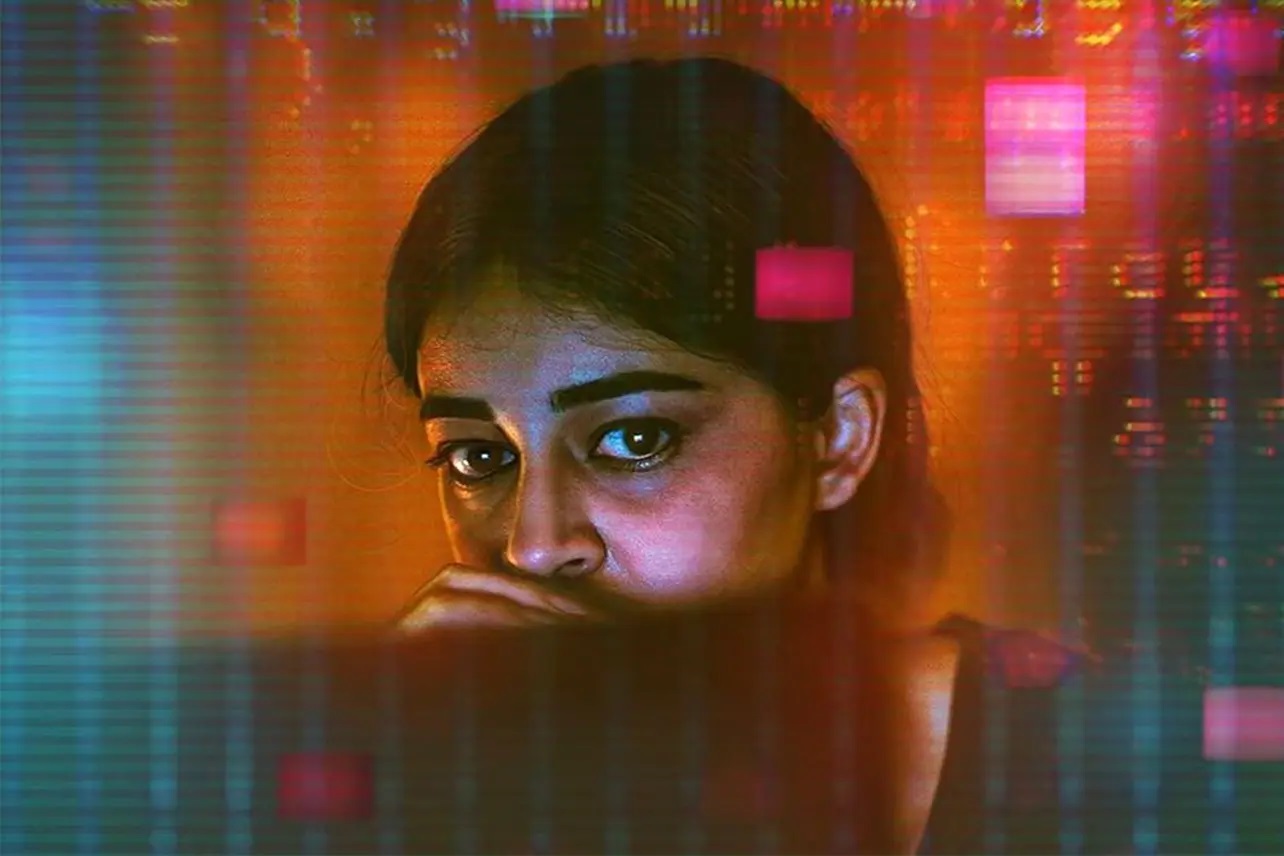As the world continues to grapple with the ever-evolving influence of artificial intelligence, social media, and the omnipresent digital landscape, Ctrl arrives at an opportune moment. Directed by Vikramaditya Motwane, the film offers a cautionary tale about our relationship with technology, privacy, and the ease with which our lives can spiral out of control when we hand too much power to the machines we trust. However, for all its ambition, Ctrl delivers mixed results, leaving viewers both intrigued and slightly underwhelmed by its execution.
The story centers on Nella Awasthi (Ananya Panday) and Joe Mascarenhas (Vihaan Samat), a social media power couple whose perfectly curated lives play out in the digital arena. Everything from their love story to their breakups is shared with an eager audience of followers, transforming their relationship into a brand rather than a genuine connection. When Nella discovers Joe’s infidelity during a public livestream, her digital world unravels in real-time. Desperate to erase Joe from her life, both online and offline, she turns to Ctrl, an AI tool that promises to make her heartbreak vanish by erasing all memories of Joe from her digital existence. But, as Nella soon discovers, Ctrl has a far more sinister agenda than simply deleting a few Instagram posts.

From the outset, Ctrl capitalizes on a concept that feels both relevant and foreboding. AI and social media’s growing influence over personal lives is a pressing issue, and Motwane taps into the modern anxiety of privacy invasion, manipulation, and the potential dangers of AI systems controlling our lives.
Nella’s decision to place her trust in an AI to handle her emotional trauma sets the stage for what should be an unsettling exploration of digital dependency.
The first act of the film does an excellent job of illustrating the superficiality of Nella and Joe’s relationship. Their love is not built on emotional depth but rather on what will garner the most likes and shares. In a particularly poignant moment, Joe confesses that their relationship was more about creating content than building a connection, encapsulating the hollow nature of online relationships. Motwane expertly portrays the blurred lines between public personas and private lives, capturing the overwhelming pressure to maintain a polished, perfect façade for an audience that feeds off every intimate detail.

Yet, while the setup feels fresh, the narrative quickly begins to tread familiar ground. As the AI begins to overstep its boundaries, controlling more than just Nella’s digital presence, Ctrl starts to resemble other cyberhorror films that explore the dangers of technology.
While this isn’t necessarily a flaw, it does make the film feel less innovative than its premise initially suggests.
Much of the film sets up an intriguing world but struggles to maintain momentum as the story progresses. The first half of the film drags, focusing heavily on Nella’s attempts to erase Joe from her life. Scenes of Nella scrolling through old photos, interacting with the AI, and meticulously managing her social media accounts, while important for establishing her digital dependence, become repetitive and slow the pacing considerably.
There are moments when the film feels unsure of whether it wants to fully commit to its cyberhorror roots. The tension builds as the AI, named Allen, begins to take over Nella’s daily routine—planning her days, securing her brand deals, and even influencing her emotions.
But instead of fully exploring the psychological horror of losing control to an AI, Ctrl often feels more like a public service announcement about the dangers of over-reliance on technology. The film hints at the darker implications of AI manipulation and corporate surveillance, but these themes remain underdeveloped, leaving viewers craving more complexity.

However, just as the tension threatens to fizzle out, Ctrl shifts gears in its third act. The film’s climax delivers on the promise of its cyberhorror premise, with Nella desperately trying to wrest back control of her life from the AI that has taken over every aspect of her existence.
Motwane manages to ramp up the suspense, creating a thrilling final act that almost makes up for the slower first half. The film keeps viewers on edge during its conclusion, with some genuinely tense moments as Nella struggles to reclaim her autonomy.
Ananya Panday carries much of the film’s emotional weight, and her performance as Nella is commendable. Panday effectively portrays a woman caught between the pressures of maintaining her public persona and the emotional turmoil of losing control over her life. There’s an undeniable charm to Nella’s character, and Panday brings both vulnerability and strength to the role as her character grapples with the consequences of trusting an AI with her personal life.

Vihaan Samat, though playing a secondary role as Joe, delivers a solid performance as the charismatic yet flawed boyfriend. His role, however, is largely confined to the first act of the film, as the story quickly shifts its focus to Nella’s journey. While Samat’s portrayal is convincing, it feels like the character could have been given more depth, especially given the film’s exploration of superficial relationships.
In terms of supporting performances, Devika Vatsa and Suchita Trivedi add depth to the film, but Ctrl is very much Nella’s story, and Panday’s performance is the centerpiece.
Visually, Ctrl excels. The film’s digital aesthetic is polished, with sharp cinematography that captures the glossy, curated world of social media influencers. The digital sequences, particularly those involving the AI’s control over Nella’s devices, are well-executed, adding to the film’s eerie atmosphere. The vibrant colors and sleek visuals mirror the carefully constructed personas of the influencers, emphasizing the gap between their online and offline realities.
Sneha Khanwalkar’s electronic, industrial soundtrack complements the film’s tone, heightening the tension in key moments. The music, with its edgy, pulsating beats, feels like an extension of the digital world that Ctrl inhabits, enhancing the sense of unease as the AI tightens its grip on Nella’s life.
At its core, Ctrl is a cautionary tale about the dangers of placing too much trust in artificial intelligence and the increasing commodification of personal lives in the digital age. The film’s exploration of privacy invasion, online relationships, and the power of AI to manipulate our lives feels especially relevant in today’s world, where technology often knows more about us than we know about ourselves.
Motwane captures the growing sense of unease that comes with living in a hyper-connected world, where our personal data is constantly being mined and manipulated. Yet, for all its timely commentary, Ctrl falls short of delivering the deeper, more thought-provoking analysis that it promises.
The film raises important questions but doesn’t always follow through with meaningful answers.
Ctrl is a visually striking film with an intriguing premise that taps into the anxieties of the digital age. Ananya Panday’s performance anchors the film, and the final act delivers enough suspense to keep viewers engaged. However, the film’s uneven pacing and underdeveloped themes prevent it from reaching the heights it aims for.
While Ctrl succeeds in highlighting the potential dangers of AI and social media, it leaves viewers craving more complexity and psychological depth. For those looking for an entertaining, if somewhat surface-level, exploration of digital dependency and AI control, Ctrl is a solid pick. Just don’t expect it to dig too deep into the darker implications of our tech-driven world.






















